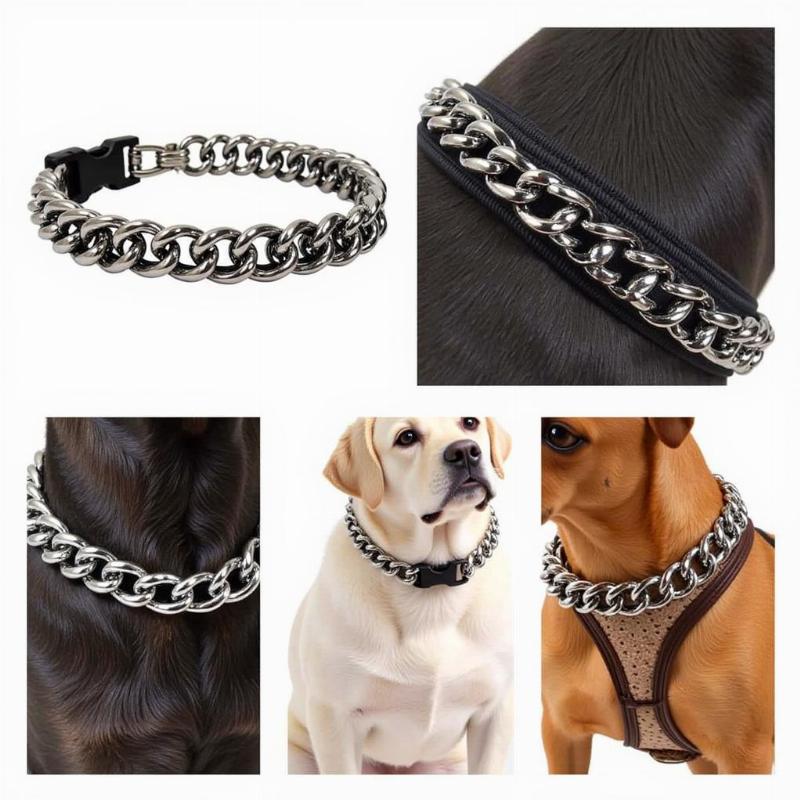Chew proof collars for dogs are a popular search term for owners struggling with destructive chewing habits. Finding a truly “chew proof” collar can be difficult, as determined dogs can damage even the toughest materials. This guide explores various options for durable dog collars, discusses important factors to consider when choosing one, and offers tips to manage your dog’s chewing behavior. Let’s dive in and discover how to protect your dog’s collar and address the underlying chewing issues.
Why Do Dogs Chew Their Collars?
Dogs chew their collars for a variety of reasons, from boredom and anxiety to teething puppies exploring their world with their mouths. Sometimes, a poorly fitting collar can cause irritation, leading to chewing. Identifying the root cause is crucial for choosing the right collar and implementing training strategies. Is your dog a puppy going through teething? An anxious chewer when left alone? Or simply a dog who loves to explore textures with their mouth? Understanding the “why” helps you find the “how” to solve the problem.
Materials: Finding the Right Collar for Your Chewer
Choosing a durable dog collar involves understanding the different materials available and their strengths and weaknesses. While no collar is entirely indestructible, some offer greater resistance to chewing than others.
Metal Collars: Strength and Durability
Metal collars, particularly those made of stainless steel, are often considered the most chew-resistant option. They are sturdy and less likely to be damaged by determined chewers. However, they can be heavy and may not be suitable for all dogs, especially smaller breeds or those with sensitive skin.
Nylon Collars: Versatility and Affordability
Nylon collars are a popular choice due to their affordability, versatility, and availability in various colors and designs. While not as chew-proof as metal, some reinforced nylon collars offer increased durability.
Biothane Collars: Waterproof and Easy to Clean
Biothane is a synthetic material known for its durability, waterproof nature, and ease of cleaning. It’s a good alternative to leather for dogs who love water or tend to get their collars dirty.
Leather Collars: Classic and Comfortable
While leather collars are stylish and comfortable, they are generally not recommended for heavy chewers. They can be easily damaged by sharp teeth and require regular maintenance.
 Different Dog Collar Materials for Chewers
Different Dog Collar Materials for Chewers
Managing Chewing Behavior: Beyond the Collar
Addressing the underlying reasons for chewing is essential for long-term success. Here are some strategies:
- Provide Plenty of Chew Toys: Offer a variety of safe and engaging chew toys to redirect your dog’s chewing instincts.
- Mental Stimulation: Keep your dog mentally stimulated with puzzle toys, training sessions, and interactive play.
- Physical Exercise: Ensure your dog gets enough physical exercise to burn off excess energy and reduce boredom.
- Training and Positive Reinforcement: Teach your dog the “leave it” command to deter them from chewing inappropriate items.
- Consult a Veterinarian or Certified Dog Trainer: If chewing persists, seek professional help to rule out any underlying medical conditions or develop a behavior modification plan.
Choosing the Right Fit
A properly fitted collar is crucial for both comfort and safety. A collar that is too tight can cause irritation and discomfort, while a collar that is too loose can easily slip off.
Conclusion: Protecting Your Dog and Their Collar
Choosing a chew proof collar for dogs involves careful consideration of your dog’s individual needs, chewing habits, and lifestyle. While a durable collar can help protect against damage, addressing the underlying chewing behavior through training and enrichment is essential for a long-term solution. Remember to prioritize a proper fit for your dog’s comfort and safety. By combining the right collar with appropriate training and management techniques, you can help your furry friend kick the chewing habit and enjoy a happy and healthy life.
FAQ
- Are there truly indestructible dog collars? While no collar is entirely indestructible, some materials like metal and biothane offer significantly more resistance to chewing than others.
- What if my dog continues to chew through collars? Consult with a veterinarian or certified dog trainer to address the underlying chewing behavior.
- How do I choose the right size collar for my dog? Measure your dog’s neck and add two fingers’ width for a comfortable fit.
- Can a tight collar cause my dog to chew more? Yes, an uncomfortable collar can lead to increased chewing. Ensure a proper fit.
- What are some good chew toys for heavy chewers? Look for durable toys made of materials like nylon or rubber specifically designed for powerful chewers.
Related Articles
- four leaf clover dog collar
- leash that dog can't chew through
- best waterproof airtag case for dog collar
- five easy hot dogs vinyl
- nylon dog collars with metal buckle
Beautdogs.us is your premier source for comprehensive dog care information, breed-specific advice, and top-quality products. We cater to both new and experienced dog owners, providing expert guidance on everything from choosing the right chew proof collar to understanding your dog’s unique needs. Contact us today for personalized support! Email: [email protected], Phone: +1 501-555-7529. Visit Beautdogs.us for all your dog-related needs!